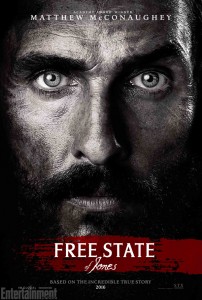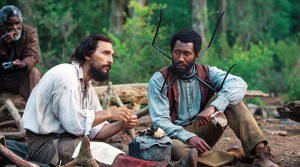 Gary Ross’ fact-based drama, Free State of Jones, tells the extraordinary story of a little-known episode in American history.
Gary Ross’ fact-based drama, Free State of Jones, tells the extraordinary story of a little-known episode in American history.
Matthew McConaughey stars as Newton “Newt” Knight, a heroic figure from the Piney Woods area of Mississippi, whose dedication to justice and equality inspired a popular rebellion, carried out against all odds.
As conceived and directed, McConaughey plays him as a fearless Mississippi farmer, who led an unlikely band of poor white farmers and runaway slaves in an armed rebellion against the Confederacy during the Civil War.
The narrative contains intermittent flash-forwards to the 1948 trial of The State of Mississippi versus Davis Knight, the great-grandson of Newt Knight and the key defendant in a miscegenation trial.
Obviously a labor of love, Free State of Jones is based on a decade long thorough research, conducted by Gary Ross, based on a story by him and Leonard Hartman.
The movie adds an honorable panel to the growing number of mainstream films about slavery and civil rights, and in this respect belongs to the universe of the Oscar-winning 12 Years a Slave, the Oscar-nominated Selma, and the upcoming Sundance Fest hit, Nat Parker’s Birth of a Nation.
Unfortunately, despite good intentions, Free State of Jones is too earnest in its liberal ideology, and suffers from narrative as well as structural problems. For starters, here is yet another story, albeit an unconventional one, centering on a noble white man, fittingly called Knight. Moreover, the whole take feels a tad too much like a star vehicle for McConaughey, who is much more careful in his choice of roles after winning the Best Actors Oscars two years ago for The Dallas Buying Club.
There are also structural shortcomings, resulting in a narrative that is both fractured and fragmented in the way that it jumps back and forth between two era, the Civil War (most of the tale is set in 1863) and 1948, a year in which a crucial, groundbreaking trial took place, with many consequences and reverberations.
Even so, I recommend that you see the film for the fascinating story, which, like its hero, is full of contradictions and ambiguities, and for McConaughey’s sharp performance, which is greatly helped by the two women in his life, well played by Kerri Russell and Gugu Mbatha-Raw.
McConaughey is well cast as the visionary leader, whose opposition to exploitation and prejudice, and his founding of the region’s first mixed-race community, made him both a celebrated and vilified presence long after the Civil War. In sharp contrast to a “rich man’s war, and poor man’s fight,” Knight and his followers took up arms against the Confederacy by establishing a rebel regiment in the rural swamps of Mississippi, which gave them tactical advantage despite being outgunned and outnumbered.
Here are the basic facts, which are never short of intriguing:
The tale is set in 1863, at the height of the Civil War, when an ideological split over slavery is at the heart of the national debate. It’s a time, in which battles are being waged all over the country: in the Gettysburg Campaign of Maryland, Pennsylvania, and Virginia, and in the South, at the Battle of Corinth and Siege of Vicksburg.
 In Mississippi, the second state to formally secede from the Union, Newton “Newt” Knight, a poor farmer from the Jones County region, is introduced as a medic in the Ambulance Corps of the Confederate Army.
In Mississippi, the second state to formally secede from the Union, Newton “Newt” Knight, a poor farmer from the Jones County region, is introduced as a medic in the Ambulance Corps of the Confederate Army.
Knight does not own slaves, and is morally opposed to secession as well as to slavery. Nevertheless, he decides to enlist rather than be conscripted, partly in order to serve in the same regiment as his kin and neighbors. As a medic, he tends to the sick and wounded rather than battle Union soldiers. Ironically, the Union’s political ideology over the war and slavery are closer to him than those of the Confederacy.
When Newt’s 14-year-old nephew, Daniel, is killed at his side in battle, Newt is demoralized by the carnage. He rejects the Twenty Negro Law–that sons of wealthy owners of twenty or more slaves are exempted from the military. He then makes a fateful decision to take Daniel’s body back home to his family for burial, Newt becomes a deserter.
 Back at his ramshackle homestead in Jones County, where his wife Serena was left to plough the fields alone, Newt discovers that Confederate cavalry and tax-in-kind agents have been commandeering, presumably for the “war effort,” his neighbors’ provisions, including animals, cotton and grain. The agents were ordered to take 10%, but routinely took much more. Newt resolves to stay in Jones County, making it his mission to safeguard his family’s and his neighbors’ property and civil rights.
Back at his ramshackle homestead in Jones County, where his wife Serena was left to plough the fields alone, Newt discovers that Confederate cavalry and tax-in-kind agents have been commandeering, presumably for the “war effort,” his neighbors’ provisions, including animals, cotton and grain. The agents were ordered to take 10%, but routinely took much more. Newt resolves to stay in Jones County, making it his mission to safeguard his family’s and his neighbors’ property and civil rights.
A confrontation occurs, when Confederate cavalry officer Lt. Barbour, tasked with tracking down deserters, challenges Newt, who is resisting the Calvary’s attempt to appropriate provisions from his widow neighbor. After an armed standoff, Newt is branded an outlaw and must flee the area.

Matthew McConaughey (center) and Mahershala Ali (center left) star in THE FREE STATE OF JONES
Injured by hounds during his getaway, Newt is aided by the proprietress of the local road house. With her help, he escapes into the Mississippi swamps. There he meets runaway slave Moses Washington and his group of fellow maroons. Barely surviving in a makeshift camp, they hide in fear of discovery.
While in hiding, Newt meets a young woman, Rachel, who previously tended to Newt and Serena’s sick infant son and now aids the refugees with provisions. As a house servant to a wealthy plantation owner, Rachel can freely move between the plantation and the maroon camp where she brings vital necessities and news. Newt is struck by Rachel’s beauty, poise, compassion and intelligence. Meanwhile, Newt’s growing infamy as a deserter takes its toll on his wife Serena, who is forced to pack up her meager belongings and leave Jones County.
Officially charged with capital sedition and treason, Newt settles in the swamps with his unlikely fellow renegades. Eventually, several white Confederate deserter-compatriots join Newt and the runaways. Newt accepting his role as the leader of this rebellion–the men (black and white) call themselves The Knight Company.
From their hideout, newly armed, “Captain” Newt leads his new unit in several violent raids and skirmishes against the rebel soldiers–led by Lt. Barbour and his officious commanding officer Colonel Elias Hood–who struggle to route them from their safe haven.

MATTHEW McCONAUGHEY stars in THE FREE STATE OF JONES
Unabashedly pro-Union, the Knight Company grows from a few men to 500 as the ragtag band of deserters and runaway slaves are joined by other locals formerly loyal to the Confederacy. The Knight Company is comprised of hundreds of former slaves, runaways, and yeoman farmers from neighboring Jones, Perry, and Jasper Counties–men, women, and children who have had enough of the rebel army appropriating their property. Well-armed and provisioned, the “Southern Yankees” pronounce a declaration of independence from the Confederacy and proclaim their community the “Free State of Jones” in a powerful affront to the Confederacy.
Knight’s leadership and cunning tactics, as well as the impenetrableness of the swamps, combine to repel and confound the South’s efforts to quash the rebellion. The results of the guerilla company’s efforts ultimately cripple the region’s tax collection system, with the rebels seizing and distributing Confederate supplies, and driving out Confederate officials from Jones County and beyond. Espousing core principles of equality and freedom for all men regardless of color, this quasi-political force manages to keep control of their “Free State” for the duration of the war, despite many deadly and heartrending battles along the way.
 When General Robert E. Lee’s surrender marks Union victory and the end of the Civil War, it ushers in Reconstruction, with its promise of freedom for slaves. But the post-war aftermath and rebuilding of the South signals more challenges to the country, and to Jones County.
When General Robert E. Lee’s surrender marks Union victory and the end of the Civil War, it ushers in Reconstruction, with its promise of freedom for slaves. But the post-war aftermath and rebuilding of the South signals more challenges to the country, and to Jones County.
The pledges of land (commonly known as 40 acres and a mule) made to black Americans during Reconstruction do not come to fruition, and a new wave of racial intolerance arises, led by a violent terrorist group of white supremacists–the Ku Klux Klan–who rise to power vengefully targeting former slaves and their allies, with their ultimate goal being to restore the land, political supremacy and wealth to those who supported the war in the first place.
Newt, Rachel and their neighbors retreat to Soso, Mississippi. Their common-law marriage becomes one of the first mixed racial unions in the area. Newt’s wife, Serena, eventually returns, and although Newt has already created a home with Rachel, Serena stays in a cabin on the couple’s farm.
Knight becomes more politically active, taking an aggressive stand against the new negro apprenticeship laws, building schools for the Freedman, and taking a leadership position in the Union League, whose risky mission is to help Freedmen register to vote.
Eighty-five years after Newt Knight and his band of white and black rebels fight the Confederacy, Davis Knight, Newt’s great grandson is indicted for violating Mississippi law by marrying a white woman, Junie Lee Spradley.
The accusation is based on the assumption that as Newt Knight’s great grandson, his great grandmother must have been Rachel, and therefore he should be considered one-eighth black, and thus legally prohibited from marrying ‘outside his race.’
The resolution of this historic case is groundbreaking, and it becomes an influential tale in the South for decades. Indeed, the legacy of the mixed-race community that grew from Newt and Rachel’s relationship is still evident in the South.
Cast
Gugu Mbatha-Raw (Beyond the Lights) plays Newt’s eventual common-law wife, Rachel. Mahershala Ali is cast as Moses Washington, a runaway slave and a guiding force in the rebellion. Keri Russell (Waitress) plays his first wife, Serena Knight.
Free State of Jones is written and directed by four-time Oscar-nominee Gary Ross (The Hunger Games, Seabiscuit, Pleasantville), based on his thorough independent research, from a story by Ross and Leonard Hartman. It is produced by Ross through his Larger Than Life Productions shingle, along with Scott Stuber (Ted) and Jon Kilik (Foxcatcher, The Hunger Games). Diana Alvarez (The Hunger Games) is co- producer.
The production team includes director of photography Benoit Delhomme (The Theory of Everything), production designer Philip Messina (The Hunger Games), Oscar-nominated editor Juliette Welfling (The Hunger Games, The Diving Bell and the Butterfly), Oscar-nominated editor Pamela Martin (The Fighter, Little Miss Sunshine), costume designer Louise Frogley (Unbroken, Flight), composer Nicholas Britell (12 Years A Slave) and Grammy winning songwriter Lucinda Williams.










